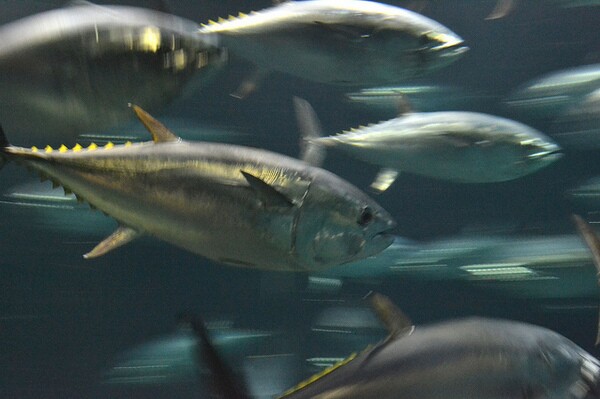Feds to Consider Ban on Bluefin Tuna Fishing

The Federal agency that manages marine endangered species announced Wednesday that it's considering a ban on recreational or commercial fishing of a species of tuna that extremely popular among fans of sashimi.
The Fisheries division of the National Oceanic and Atmospheric Administration (NOAA Fisheries) is opening a formal rulemaking process to determine whether it should add Pacific bluefin tuna (Thunnus orientalis) to its list of fish species that must be released immediately if caught. The fish is sold in sushi joints as "maguro."
Pacific bluefin catches have dropped dramatically in recent years, to the point where sport fishing now accounts for more of the U.S. catch than commercial fishing. And scientists say the species now stands at less than five percent of its historic numbers.
The move comes in response to an April petition by the Center for Biological Diversity asking NOAA Fisheries to amend its Fishery Management Plan for U.S. West Coast Fisheries for Highly Migratory Species, a program with a name too long to acronym that addresses Pacific Ocean fish who divide their time between the U.S. West Coast and places like Japan and Siberia. CBD's petition asked NOAA Fisheries to rewrite the plan to include a ban of catch of Pacific bluefin, or at least to implement annual catch limits and minimum sizes for the bluefin.
Other "highly migratory" Pacific fish species whose catch is prohibited under the plan include basking, great white, and megamouth sharks, as well as Pacific halibut.
In its announcement this week, NOAA Fisheries says it will consider doing just what CBD asked in April. "This initiation of this important process provides a glimmer of hope in a sea of bleak news for Pacific bluefin tuna," said CBD's Catherine Kilduff. "Saving Pacific bluefin tuna from the world's insatiable appetite for sushi requires action at all levels, starting with protection in U.S. waters."
Two related species of bluefin, the Atlantic and the southern, are in even worse shape, listed as Endangered and Critically Endangered, respectively, by the International Union for the Conservation of Nature. The plight of those species -- and now the Pacific bluefin -- has prompted many conservation groups to encourage a boycott of bluefin tuna regardless of species.
90 percent of the global Pacific bluefin catch in recent years has been juvenile fish under two years of age and less than three feet long. Pacific bluefin reach maturity at around five years of age, and can live as long as 20 years or more. The absence of adults in a drastically lower catch is a sign of severe overfishing, as older fish die off and few juvenile fish survive to adulthood.
Pacific bluefin spawn in the western Pacific off the coast of Japan, then swim east toward North America to feed on smaller fish, including California anchovies. California's bluefin fishery has historically been small relative to the global catch, but adults caught off the Southern California coast have reached ten feet in length and weighed half a ton.
About 90 percent of the Pacific bluefin catch is consumed in Japan, where one 489-pound bluefin caught in 2012 brought about $3,500 per pound at a fish market in Tokyo. That kind of economic incentive has driven aggressive fishing, with the result being a steep decline in Pacific bluefin numbers. An assessment of the species' status in January 2013 found that the Pacific bluefin population had declined by more than 96 percent since the global fishing industry started targeting the fish.
Mexico closed its Pacific bluefin fishery for 2014 earlier in July after reaching its 5,000 metric ton limit for the year. The U.S. has not done the same, however, citing exemptions in its agreement with the Inter-American Tropical Tuna Commission. And disagreements among member nations have likely scuttled any chance of global catch limits for 2015.
"Even when faced with the complete destruction of the fishery, bluefin tuna fishing countries continue to have a Gold Rush mentality," said CBD's Kilduff. "Extinction looms too large to let U.S. fishery managers off the hook when negotiating behind closed doors. Prohibiting Pacific bluefin tuna catch on the West Coast will galvanize fishermen and conservationists alike to bring bluefin back to healthy levels."


